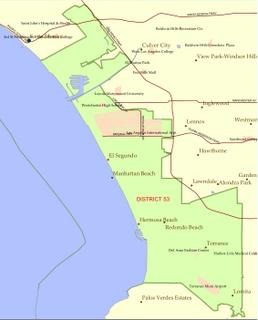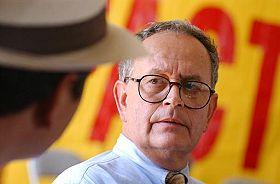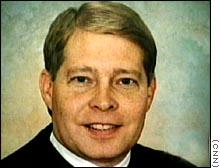One of the highlights of the gathering that took place over the weekend in Oakland was a debate between Green Party candidate for governor
Peter Camejo and former Santa Monica Mayor
Mike Feinstein on strategy for the 2006 elections in California. Former San Francisco Supervisor
Matt Gonzalez had the thankless task of moderating the discussion, and he did a good job of allowing audience participation.
Mike Feinstein promises to provide video of the event on his website, so I'll point you there when it is available, but let me lay out the arguments as I understood them.
Update: the video is here: http://www.feinstein.org/movies/oakland_strategy_session.movFeinstein is calling for the Green Party of California to develop a unified campaign platform that statewide candidates (including Camejo) and up to 20 Assembly and state Senate candidates can run on. The platform would include reform of Prop. 13, which has seriously screwed up the state's finances by making it very difficult to raise property taxes. The idea behind running 20 legislative candidates is to pick up votes down ticket in a possibly close race for Governor between Schwarzenegger and a Democrat. Feinstein also proposed allowing select progressive Democratic nominees to run simultaneously on the Green Party line if they win a Green Party primary as a write-in candidate (a procedure called fusion). This would let voters express their support for the Green Party in races where there is no Green Party candidate. (Camejo doesn't like this idea at all.) The idea behind a unified platform centered on tax reform is that Greens would show we have a plan for governing California and are not just an opposition or protest party.
Peter Camejo, on the other hand, doesn't want Greens to abandon our role as an opposition party. He seems to see us as the loyal opposition's disloyal opposition. He has
already laid out his proposal to run a slate of candidates statewide with himself at the top of the ticket. His strategy is to appeal to opponents of the war in Iraq as well as minorities, by appearing at campaign events with local organizers who are not necessarily Green, but represent a green constituency. To this end, he highlighted the case of
Santos Reyes, a man who is serving 26 years to life for a minor crime because of California's three-strikes law.
Camejo is also very involved in debates over the direction of the Green Party, to the extent of getting involved in County Council elections, and I think he placed too much emphasis on this issue, especially in a debate about campaign strategy. Certainly some of this is applicable to the debate at hand, given Feinstein's support for fusion, but it seems to take precedence in Camejo's mind even over his own statewide campaign. Camejo believes that there is a sizable minority in the party that wants to use the party to help Democrats, and that they need to be stopped. He has believed this ever since the party nationally nominated longtime Green
David Cobb as its presidential candidate in 2004. Cobb ran using a strategy he termed the "safe-states strategy". It meant he campaigned mostly in states that were not seriously at play between the President and his Democratic challenger. This strategy has a couple of obvious merits (for instance, more people are liable to vote for a Green in "safe states"), but Camejo, who ran for Vice President on a ticket with
Ralph Nader, saw this as capitulation to the Democrats--what Camejo terms lesser-evilism.
This is a fair debate to have within the Green Party, but Camejo misses two points: Lesser-evilism is not a strong current in the Green Party, and very few of the 150,000 or so registered Greens in the state care about it either way. Feinstein himself said he would be willing to drop his support for fusion given the overwhelmingly negative response it has received among Green Party activists across the state. Camejo invited Feinstein to run against him so they could have this debate up and down the state in the Green Party primary. What a horrible idea! We are not going to grow the party by airing our internal divisions as campaign platforms. Feinstein made a good point in basically endorsing Camejo, and suggesting he spend more time on his own campaign. It is Camejo's campaign skills, after all, that have made him the party star that he is today.
 Prop 78 before reading its poll numbers
Prop 78 before reading its poll numbers An e-mail from my girl Erin of
An e-mail from my girl Erin of 

 Today I was listening to a podcast of
Today I was listening to a podcast of  The LA Times has an article today on the
The LA Times has an article today on the 
 I'm off to the L.A.
I'm off to the L.A.  Health care should be one of the top three or four issues for the Green Party* because it is an important issue--and a source of stress--for a lot of people, it's getting worse, and the Democrats and Republicans aren't doing much about it, at least not nationally. In California, there is actually a really good piece of Democratic legislation on this topic, but it isn't clear how much effort Democrats are willing to put into it.
Health care should be one of the top three or four issues for the Green Party* because it is an important issue--and a source of stress--for a lot of people, it's getting worse, and the Democrats and Republicans aren't doing much about it, at least not nationally. In California, there is actually a really good piece of Democratic legislation on this topic, but it isn't clear how much effort Democrats are willing to put into it.
 Did you know there was an election today in LA? It got as little press here as the primary occuring on the same day in New York. In the special election to fill Assembly District 53 (above), which runs along the Pacific from Marina Del Rey to Torrance, it looks like Democrat Ted Lieu
Did you know there was an election today in LA? It got as little press here as the primary occuring on the same day in New York. In the special election to fill Assembly District 53 (above), which runs along the Pacific from Marina Del Rey to Torrance, it looks like Democrat Ted Lieu  I just recieved a forward of an essay by
I just recieved a forward of an essay by 
 In July, a Federal Appeals Court heard arguments about Jose Padilla, the "dirty bomber" (except the government now admits that that was a false accusation), who has been held in prison for more than three years without a trial. As I
In July, a Federal Appeals Court heard arguments about Jose Padilla, the "dirty bomber" (except the government now admits that that was a false accusation), who has been held in prison for more than three years without a trial. As I  Between a rock and a hard place, Schwarzenegger will always choose to pander to the right. Remember when he ran saying he could go get money from Republicans in Washington? The tables have certainly been turned. Here are a couple new examples:
Between a rock and a hard place, Schwarzenegger will always choose to pander to the right. Remember when he ran saying he could go get money from Republicans in Washington? The tables have certainly been turned. Here are a couple new examples:

 I got this picture off the New York Times website. It is a photo of two people in New Orleans preparing to defend their property and provisions from looters.
I got this picture off the New York Times website. It is a photo of two people in New Orleans preparing to defend their property and provisions from looters. 